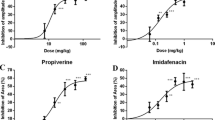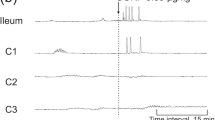Abstract
Objective: Cerulein and neostigmine are prokinetic drugs whose potency and effective dose range are barely known. The aim of this study was to assess their benefit for normal and compromised peristalsis. Design: In vitro, isolated segments of guinea pig small intestine. Setting : University laboratory. Interventions: Small bowel segments were mounted in tissue baths and luminally perfused with Tyrode solution. Test drugs (prokinetic: cerulein, neostigmine; inhibitory: atropine, hexamethonium, epinephrine, sufentanil) were added to the tissue bath. Measurements and results: Peristalsis was quantified via changes in the peristaltic pressure threshold. One-way and two-way analysis of variance (ANOVA) were used for statistical analysis. Cerulein (0.03–100 nM) stimulated normal peristalsis in a concentration-dependent manner and reversed paralysis of peristalsis induced by all inhibitory test drugs to a similar extent. The properistaltic effect of neostigmine was limited to a narrow concentration range (0.03–0.1 µM), whereas concentrations >0.3 µM inhibited peristalsis. Neostigmine more effectively counteracted blockage of peristalsis caused by atropine than that caused by hexamethonium. The inhibitory effects of epinephrine and sufentanil on peristalsis were reversed only at the concentration range of 0.1–0.3 µM neostigmine. Conclusions: Cerulein stimulates normal peristalsis in vitro at a wide concentration range and reverses blockage of peristalsis caused by drugs with a site of action either on the enteric nervous system or intestinal smooth muscle. Neostigmine’s prokinetic effect, to the contrary, is limited to a small concentration range and best seen when peristalsis is depressed by blockage of cholinergic muscle activation.






Similar content being viewed by others
References
Kehlet H, Holte K (2001) Review of postoperative ileus. Am J Surg 182:3–10
Wattwil M (1989) Postoperative pain relief and gastrointestinal motility. Acta Chir Scand [Suppl] 550:140–145
Clevers GJ, Smout AJ, van der Schee EJ, Akkermans LM (1991) Myoelectrical and motor activity of the stomach in the first days after abdominal surgery: evaluation by electrogastrography and impedance gastrography. J Gastroenterol Hepatol 6:253–259
Tollesson PO, Cassuto J, Rimback G (1992) Patterns of propulsive motility in the human colon after abdominal operations. Eur J Surg 158:233–236
Livingston EH, Passaro EP (1990) Postoperative ileus. Dig Dis Sci 35:121–132
De Winter BY, Boeckxstaens GE, De Man JG, Moreels TG, Herman AG, Pelckmans PA (1997) Effect of adrenergic and nitrergic blockade on experimental ileus in rats. Br J Pharmacol 120:464–468
De Winter BY, Boeckxstaens GE, De Man JG, Moreels TG, Schuurkes JA, Peeters TL, Herman AG, Pelckmans PA (1999) Effect of different prokinetic agents and a novel enterokinetic agent on postoperative ileus in rats. Gut 45:713–718
Eskandari MK, Kalff JC, Billiar TR, Lee KK, Bauer AJ (1999) LPS-induced muscularis macrophage nitric oxide suppresses rat jejunal circular muscle activity. Am J Physiol 277:478–486
Kalff JC, Schraut WH, Simmons RL, Bauer AJ (1998) Surgical manipulation of the gut elicits an intestinal muscularis inflammatory response resulting in postsurgical ileus. Ann Surg 228:652–663
Kalff JC, Carlos TM, Schraut WH, Billiar TR, Simmons RL, Bauer AJ (1999) Surgical-induced leukocytic infiltrates within the rat intestinal muscularis mediate postoperative ileus. Gastroenterology 117:378–387
Kalff JC, Turler A, Schwarz NT, Schraut WH, Lee KK, Tweardy DJ, Billiar TR, Simmons RL, Bauer AJ (2003) Intra-abdominal activation of a local inflammatory response within the human muscularis externa during laparotomy. Ann Surg 237:301–315
Zielmann S, Grote R (1995) Auswirkungen der Langzeitsedierung auf die intestinale Funktion. Anaesthesist [Suppl 3] 44:549–558
Kromer W (1990) Endogenous opioids, the enteric nervous system and gut motility. Dig Dis 8:361–373
Fruhwald S, Scheidl S, Toller W, Petnehazy T, Holzer P, Metzler H, Hammer HF (2000) Low potential of dobutamine and dopexamine to block intestinal peristalsis as compared with other catecholamines. Crit Care Med 28:2893–2897
Fruhwald S, Herk E, Petnehazy T, Scheidl S, Holzer P, Hammer F, Metzler H (2002) Sufentanil potentiates the inhibitory effect of epinephrine on intestinal motility. Intensive Care Med 28:74–80
Shahbazian A, Heinemann A, Schmidhammer H, Beubler E, Holzer-Petsche U, Holzer P (2002) Involvement of mu- and kappa-, but not delta-opioid receptors in the peristaltic motor depression caused by endogenous and exogenous opioids in the guinea pig intestine. Br J Pharmacol 135:741–750
Vizi SE, Bertaccini G, Impicciatore M, Knoll J (1973) Evidence that acetylcholine released by gastrin and related polypeptides contributes to their effect on gastrointestinal motility. Gastroenterology 64:268–277
Dal Forno G, Pietra C, Urciuoli M, van Amsterdam FT, Toson G, Gaviraghi G, Trist D (1992) Evidence for two cholecystokinin receptors mediating the contraction of the guinea pig isolated ileum longitudinal muscle myenteric plexus. J Pharmacol Exp Ther 261:1056–1063
Holzer P, Shahbazian A, Painsipp E (2003) Evaluation of peristalsis in multiple segments of the guinea-pig isolated small intestine: optimization of tissue use by refined in vitro methodology. Altern Lab Animals 31:419–427
Vincent ME, Wetzner SM, Robbins AH (1982) Pharmacology, clinical uses, and adverse effects of ceruletide, a cholecystokinetic agent. Pharmacotherapy 2:223–234
Sternini C, Wong H, Pham T, De Giorgio R, Miller LJ, Kuntz SM, Reeve JR, Walsh JH, Raybould HE (1999) Expression of cholecystokinin A receptors in neurons innervating the rat stomach and intestine. Gastroenterology 117:1136–1146
Sadek SA, Cranford C, Eriksen C, Walker M, Campbell C, Baker PR, Wood RA, Cuschieri A (1988) Pharmacological manipulation of adynamic ileus: controlled randomized double-blind study of ceruletide on intestinal motor activity after elective abdominal surgery. Aliment Pharmacol Ther 2:47–54
Madsen PV, Olsen O, Hagen K (1986) Ceruletide and neostigmine in postoperative intestinal paralysis. A double-blind clinical controlled trial. Dis Colon Rectum 29:712–713
Frigo GM, Lecchini S, Marcoli M, Tonini M, D’Angelo L, Crema A (1984) Changes in sensitivity to the inhibitory effects of adrenergic agonists on intestinal motor activity after chronic sympathetic denervation. Naunyn Schmiedebergs Arch Pharmacol 325:145–152
Holzer P, Lembeck F (1979) Effect of neuropeptides on the efficiency of the peristaltic reflex. Naunyn Schmiedebergs Arch Pharmacol 307:257–264
Marcoli M, Lecchini S, De Ponti F, D’Angelo L, Crema A, Frigo GM (1985) Subsensitivity of enteric cholinergic neurones to alpha2-adrenoceptor agonists after chronic sympathetic denervation. Naunyn Schmiedebergs Arch Pharmacol 329:271–277
Taguchi A, Sharma N, Saleem RM, Sessler DI, Carpenter RL, Seyedsadr M, Kurz A (2001) Selective postoperative inhibition of gastrointestinal opioid receptors. N Engl J Med 345:935–940
Tonini M, Costa M (1990) A pharmacological analysis of the neuronal circuitry involved in distension-evoked enteric excitatory reflex. Neuroscience 38:787–795
Holzer P, Lippe IT, Heinemann A, Bartho L (1998) Tachykinin NK1 and NK2 receptor-mediated control of peristaltic propulsion in the guinea-pig small intestine in vitro. Neuropharmacology 37:131–138
Prasad M, Matthews JB (1999) Deflating postoperative ileus. Gastroenterology 117:489–492
Myrhoj T, Olsen O, Wengel B (1988) Neostigmine in postoperative intestinal paralysis. A double-blind, clinical, controlled trial. Dis Colon Rectum 31:378–379
Kreis ME, Kasparek M, Zittel TT, Becker HD, Jehle EC (2001) Neostigmine increases postoperative colonic motility in patients undergoing colorectal surgery. Surgery 130:449–456
van der Spoel JI, Oudemans-van Straaten HM, Stoutenbeek CP, Bosman RJ, Zandstra DF (2001) Neostigmine resolves critical illness-related colonic ileus in intensive care patients with multiple organ failure—a prospective, double-blind, placebo-controlled trial. Intensive Care Med 27:822–827
Davison SC, Hyman N, Prentis RA, Dehghan A, Chan K (1980) The simultaneous monitoring of plasma levels of neostigmine and pyridostigmine in man. Methods Find Exp Clin Pharmacol 2:77–82
Acknowledgement
This study was supported by a grant from the Jubilee Funds of the Austrian National Bank
Author information
Authors and Affiliations
Corresponding author
Rights and permissions
About this article
Cite this article
Fruhwald, S., Herk, E., Hammer, H.F. et al. Differential reversal of drug-induced small bowel paralysis by cerulein and neostigmine. Intensive Care Med 30, 1414–1420 (2004). https://doi.org/10.1007/s00134-004-2317-2
Received:
Accepted:
Published:
Issue Date:
DOI: https://doi.org/10.1007/s00134-004-2317-2




